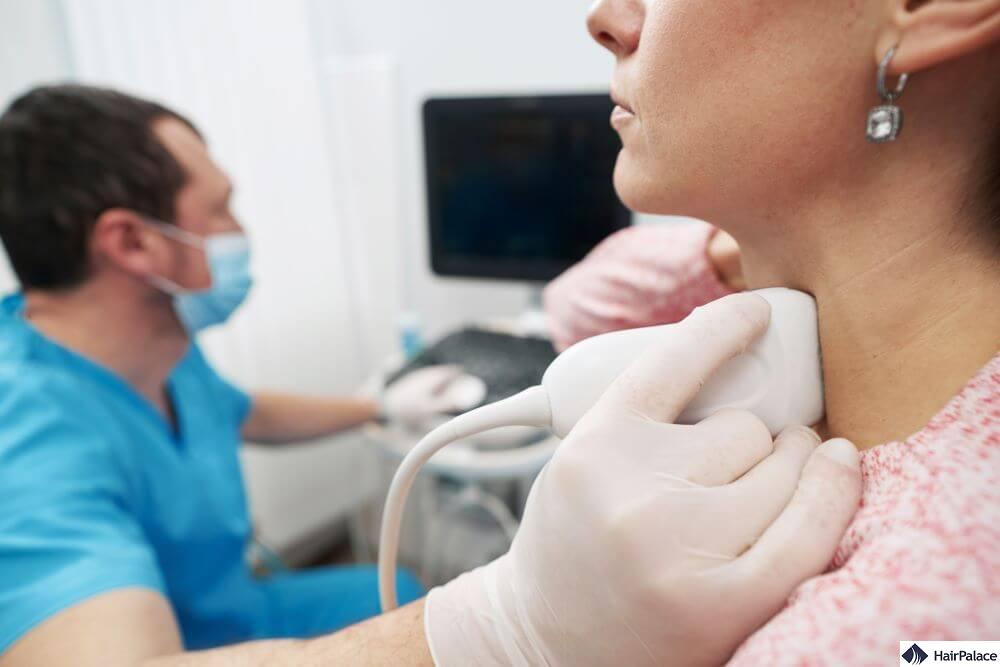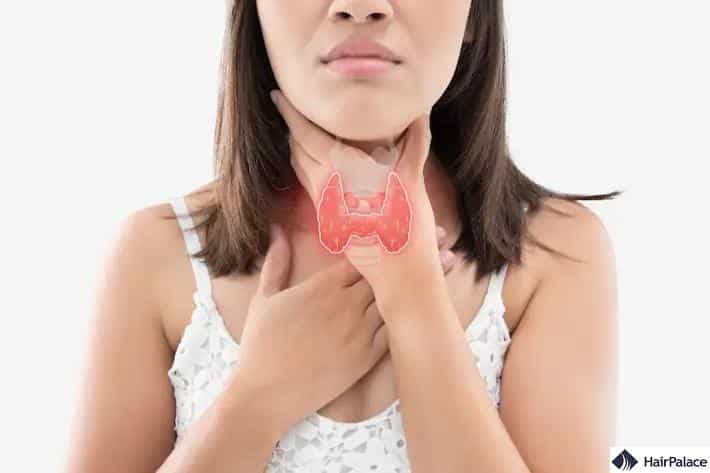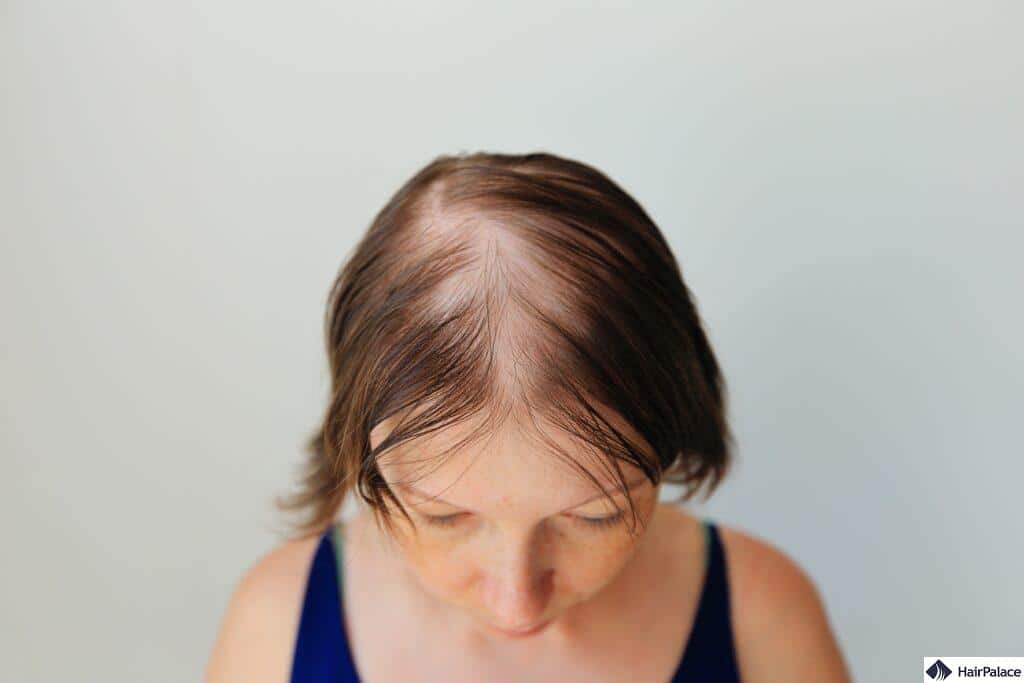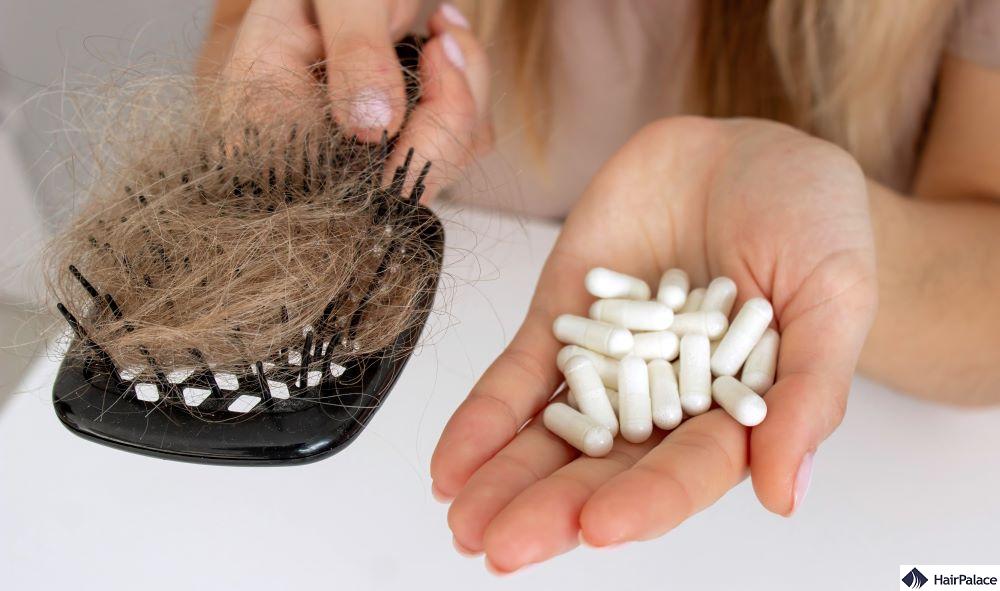Thyroid Hair Loss: Causes and Treatment

The thyroid gland plays a vital role in regulating the body’s metabolism, energy, and cell renewal, including the growth cycle of hair.
When the thyroid becomes underactive (hypothyroidism) or overactive (hyperthyroidism), it can disrupt this cycle and lead to noticeable hair thinning or excessive shedding.
Unlike genetic hair loss, thyroid-related hair loss is usually diffuse, affecting the entire scalp.
The good news is that with proper diagnosis and treatment, hair typically regrows.
In this article, we’ll explore the main causes of thyroid hair loss and the most effective treatment options to restore both thyroid health and healthy hair growth.
- What is the thyroid?
- Thyroid and hair loss
- Thyroid symptoms (hair loss)
- What does thyroid hair loss look like?
- Thyroid hair loss treatment

What is the thyroid?
The thyroid is a butterfly-shaped gland situated at the front of the neck, just beneath the Adam’s apple.
It’s part of the endocrine system, which produces and regulates hormones in the body.
Its main role is to produce thyroid hormones (primarily thyroxine and triiodothyronine ) that control your metabolism. These hormones influence:
- Heart rate and blood pressure
- Body temperature
- Weight regulation
- Energy levels
- Growth and development
- Human hair growth
The thyroid gland works under the control of the pituitary gland, which releases thyroid-stimulating hormone (TSH) to regulate the amount of hormone the thyroid produces.
If the thyroid produces too much hormone (hyperthyroidism) or too little (hypothyroidism), it can cause noticeable health problems.

Thyroid and hair loss
Thyroid hormones (T3 and T4) are essential for controlling and regulating the hair follicle growth cycle.
These hormones influence metabolism and cell turnover, so when hormone levels become unbalanced, the normal hair cycle is disrupted.
Under healthy conditions, hair grows in phases: growth (anagen), rest (telogen), and shedding (exogen).
However, thyroid problems and certain autoimmune thyroid diseases can cause more hairs to shift into the resting or shedding phases, leading to diffuse thinning across the scalp.
Underactive thyroid hair loss
When the thyroid is underactive, the gland does not produce enough thyroid hormones, which slows down many body processes, including the hair growth cycle.
This thyroid dysfunction often results in hair loss and changes in hair texture.
People with hypothyroidism may notice their hair becoming dry, coarse, and brittle, and shedding tends to be diffuse, meaning it occurs all over the scalp rather than in patches.
A classic sign is the thinning or loss of the outer third of the eyebrows.
Because the human hair cycle slows down, new hairs take longer to grow in, so overall hair volume decreases.
However, proper treatment typically restores normal hair growth within 3–6 months.
Supporting hair recovery with good nutrition (protein, iron, zinc, and vitamin D) and gentle hair care can also help thyroid issues.
Overactive thyroid hair loss
When the thyroid is overactive (a condition called hyperthyroidism), it produces too much thyroid hormone. Unlike hypothyroidism, this can speed up the body’s processes.
Because the cycle moves too quickly, hairs enter the resting and shedding phases sooner than they should, resulting in diffuse hair thinning across the scalp.
Hair affected by hyperthyroidism often becomes fine, soft, and fragile, and the excessive shedding can make it appear flat or sparse.
Unlike patchy hair loss seen with some other conditions, thyroid-related shedding usually impacts the entire scalp evenly.
The positive side is that, once thyroid hormone levels are brought back into balance with thyroid medication, the hair loss is generally reversible.
Just like before, a balanced diet and maintaining healthy hair care habits can support the recovery process.
Thyroid symptoms (hair loss)
The symptoms of thyroid problems depend on whether the gland is underactive (hypothyroidism) or overactive (hyperthyroidism).
Since the thyroid regulates metabolism, its imbalance affects many parts of the body.
Overactive thyroid
When the thyroid does not produce enough hormones, body functions slow down. Common symptoms include:
- Fatigue and low energy
- Weight gain
- Dry, coarse skin and hair; hair loss
- Cold intolerance
- Constipation
- Puffy face, swelling in hands/feet
- Slow heart rate
- Depression, poor memory, difficulty concentrating
- Hoarseness and slowed speech
Underactive thyroid
When the thyroid produces too much hormone, the body’s functions speed up. Symptoms often include:
- Unintentional weight loss
- Rapid heartbeat
- Anxiety, nervousness, restlessness
- Tremors
- Heat intolerance, excessive sweating
- Fine, brittle hair and diffuse hair loss
- Diarrhoea or more frequent bowel movements
- Trouble sleeping
- Bulging eyes
What does thyroid hair loss look like?
Thyroid hair loss typically appears differently from genetic or patchy types of hair loss.
Because thyroid hormones affect the entire hair growth cycle, the shedding is generally diffuse, meaning it happens across the whole scalp instead of just in one area.
The good news is that thyroid-related hair loss is usually reversible once hormone levels are corrected, though it can take 3–6 months for regrowth to become visible.

Thyroid hair loss treatment
Thyroid hair loss treatment focuses on correcting the underlying thyroid imbalance and supporting healthy hair regrowth.
Since the problem stems from the manner it produces hormones, hair usually improves once thyroid function is stabilised.
Underactive thyroid treatment
The treatment of hair loss caused by hypothyroidism focuses on restoring hormone balance and supporting hair health.
The primary therapy is levothyroxine (synthetic T4), which helps normalise thyroid hormone levels. Hair regrowth typically begins once the correct dose is stabilised, although it may take 3–6 months to see improvement.
To aid recovery, it’s important to maintain good nutrition with iron, zinc, selenium, vitamin D, omega-3 fatty acids, and adequate protein, since deficiencies are common in hypothyroidism.
Because the condition often makes hair dry and brittle, gentle care with moisturising shampoos and avoiding harsh chemicals or heat styling can also help strengthen and protect the hair.
Overactive thyroid treatment
The treatment of hair loss caused by hyperthyroidism centres on bringing thyroid levels under control.
Treatment options may involve antithyroid medications like methimazole or propylthiouracil, radioactive iodine therapy, or, in some cases, surgery.
Once hormone levels are stabilised, hair shedding usually decreases. Improvement may take time, as the hair cycle needs to recover.
Hyperthyroidism can also cause nutrient depletion, particularly of vitamin D, calcium, magnesium, and protein.
Restoring these nutrients is important to support healthy regrowth.
Because the hair often becomes fine, fragile, and prone to shedding, gentle care is essential.
Strengthening shampoos, avoiding over-brushing, and steering clear of tight hairstyles can help protect the hair during recovery.
Vitamins for thyroid hair loss

When it comes to thyroid-related hair loss, vitamins and minerals play an important supporting role in treatment.
They cannot cure the thyroid disorder itself, but they help improve hair quality, encourage regrowth, and correct common deficiencies that often accompany thyroid imbalances.
- Vitamin D: Deficiency is common in both hypothyroidism and hyperthyroidism, and low levels are linked to hair thinning. Adequate vitamin D supports follicle cycling and stronger regrowth.
- Vitamin B12: Low levels are often seen in hypothyroidism and can contribute to hair loss, fatigue, and poor cell renewal. Supplementing may restore energy and improve hair health.
- Biotin (Vitamin B7): Supports keratin production, strengthens hair shafts, and helps reduce brittleness. While true deficiency is rare, supplementation can be useful if the diet is lacking.
- Iron: Not a vitamin but crucial; iron deficiency frequently overlaps with thyroid disorders and is a leading cause of hair shedding.
- Zinc & Selenium: Both minerals are essential for thyroid hormone production and immune balance, and deficiencies can worsen hair loss.
Vitamins and minerals support thyroid hair loss recovery by strengthening existing hair, reducing shedding, and improving follicle health.
Nutrients like selenium and zinc also aid thyroid function, while overall energy and metabolism benefit from proper supplementation.
However, they are only adjunct therapy. The main treatment should involve correcting the thyroid imbalance.
Once hormone levels are stabilised, vitamins can help speed regrowth and improve hair quality.
FAQ
Thyroid disorders (both hypo- and hyperthyroidism) can cause hair loss by disrupting hormone balance and the hair growth cycle.
Last medically reviewed on September 29th, 2025
- Owecka B, Tomaszewska A, Dobrzeniecki K, Owecki M. The Hormonal Background of Hair Loss in Non-Scarring Alopecias. Biomedicines. 2024 Feb 24;12(3):513. doi: 10.3390/biomedicines12030513. PMID: 38540126; PMCID: PMC10968111.https://pubmed.ncbi.nlm.nih.gov/38540126/
- Hussein RS, Atia T, Bin Dayel S. Impact of Thyroid Dysfunction on Hair Disorders. Cureus. 2023 Aug 10;15(8):e43266. doi: 10.7759/cureus.43266. PMID: 37692605; PMCID: PMC10492440.https://pubmed.ncbi.nlm.nih.gov/37692605/


